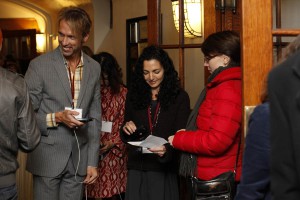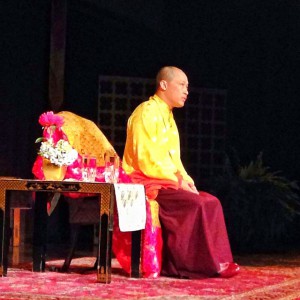Saturday
Featured StoriesRising to the Challenge with the Sakyong
by Andria Cheng, Shambhala Times Guest Reporter
The crowd of 800 packing the auditorium of the New York Society for Ethical Culture on Friday night to hear Sakyong Mipham Rinpoche speak was itself a microcosm of society.
There were those whose involvement with Shambhala go as far back as the 70s when they heard directly from the Sakyong’s father, Shambhala founder Chogyam Trungpa Rinpoche.
There were those who’ve only been Shambhala members for a few years and never heard from the Sakyong in person. They were there to “know him more personally,” instead of an experience so far “one step removed.” Some came to get “recharged” because “it’s invigorating to hear from people who have such a big mind.”
At the same time, there were also those who don’t meditate and wanted to know if meditation can stop their “inner dialogue.” And those who’ve never set foot in a Shambhala center but showed up after having read all of the Sakyong’s books and describing how those teachings from the books have already changed their lives and taken them to “another place” they’ve always wanted to go.
All of them, young and old and from Asheville, North Carolina to Halifax, Canada, listened intently as the Sakyong gave his first public talk in New York since 2008, in celebration of the 40th anniversary of the New York Shambhala Center. This was also an offering to the Center as it prepares for the move to a yet-to-be-determined location next year.
Beginning with a bow to and from the audience that underpinned the central theme of his talk about basic human goodness and connectedness, the Sakyong spoke several times about society and humanity being at a “crossroads.”
“We are in a phase of tremendous chaos and what’s going to come out of this” is critical, he said. “One of the most important issues for us is the issue of human nature. How we decide about humanity is essential.
“The notion of an awakened society is seeing humanity as good. It’s complete, free from fault. It’s a sense of worthiness. How a person feels about themselves has big social relevance.”
He recounted some of the personal journey he went through and how his father had taught him about basic human connectivity through something as simple as father and son sitting alone together on a porch or having dinner together.
“Another person’s existence is being acknowledged,” he said. “For many, we just get tired and overwhelmed, but can we begin to shift and relate to others and create a domino effect where we are no longer numb to the world? The notion of bravery is essential.”
When an individual has a deep sense of conviction and confidence about human basic goodness, he said it will have a dramatic effect on all aspects of the society, environment, economy and education.
“Are we passing on to the children tremendous burden or guilt?” he asked. “Is it going to be fault- based education or encouragement-based?”
The Sakyong went on to say that the journey to feel basic goodness is an individual one that each person has to go through.
“The only thing I can do is to inspire you to have the confidence to think you can,” he said. “There’s no one whose life is meaningless. All of us are creating our own principles of the day as we get up. There’s a ceremony of how we brush our teeth and put on our shoes. What kind of ceremony are we in? Is it a ceremony of courage or a ceremony of despair?”
The Sakyong then invited everyone to join him in a brief meditation.“Human beings have discovered the incredible raw power of the mind,” he said. “When a person sits down, all of society sits down. The most important step with meditation is to feel how we feel and not dissociate with our humanity. When we sit in quiet, it’s not that we are doing nothing. There’s a sense of potency.
“There’s going to be a moment where there’s self empowerment. The moment of being there and not panicking. It’s a journey that we begin to trust. We become sufficient and turn doubt into confidence.”
And that confidence includes feeling what’s often considered negative emotions like sadness.
“The notion of sadness is when we finally take time to absorb what’s happening,” he said, in response to a question from a 9-11 survivor who is going deaf and described how she saw nothing but “extreme sadness” in herself. “It’s a signal to open up. It’s a sense of poetry and beauty. You shouldn’t think of it as something to be ashamed of or ignored.”
“It’s important not to think of sadness as a failure,” he said in response to another question about sadness. “It’s almost a vanguard of bravery and engagement.”
The event ended with a book signing of the Sakyong’s most recent book, The Shambhala Principle.
Barbara Fasano, a jazz singer who’d only known him through his books without having been to a Shambhala center, was one of the hundreds in line.
“It’s just the message of the moment,” she said. “Every word is so inevitable. I feel this tenderness for him. What he’s trying to do is so profound.”
~~
For more information about the program this weekend with Sakyong Mipham Rinpoche in New York City, please click here.
A special thanks to Andria Cheng for guest reporting for the Shambhala Times!







Nov 13, 2013
Reply
Thanks so much to Andria for this report. I was there and this is a generous sampling of the event.
Nov 12, 2013
Reply
Has he stopped eating meat yet? (Abstain from killing).
Nov 9, 2013
Reply
Thank you Andria!